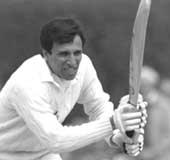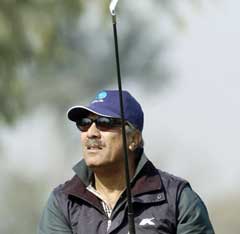|
|
| Help | |
| You are here: Rediff Home » India » Cricket » Report |
|
| |||||||||||||||||||||||
|
| |||||||||||||||||||||||
Kerry Packer changed cricket. For better or for worse is a question that will haunt the cricket world forever.
 No one from cricket's non-playing faculty made a bigger impact on the game than the Australian media magnate.
No one from cricket's non-playing faculty made a bigger impact on the game than the Australian media magnate.
He replaced revered white cricket flannels with coloured clothing and took the game to floodlit grounds with his World Series cricket series in the late 1970s. He turned cricket into a huge television spectacle and adorned it with the biggest names in the sport. He brought in money to cricket that was unheard of.
Borne out of a grudge to win exclusive television coverage in Australia, Packer altered the face of cricket forever. Though the cricket establishment tried to snub it, the World Series started to grow as the audience supported it fervently.
After the series, the players returned to the establishment as highly-paid professionals, while Packer got the television rights he wanted and millions of people who had never been interested in cricket were suddenly transfixed by the game.
After surviving a stroke in 1990 and reviving after being declared clinically dead for eight minutes, Packer died in his sleep on Tuesday at the age of 68.
Two Pakistan cricketing legends pay tributes to the man who revolutionised cricket.
Asif Iqbal
 It is a very sad day, for cricketers in particular.
It is a very sad day, for cricketers in particular.
It was because of Kerry Packer that the players got their rightful remuneration. For that I think all the players should be grateful to him. He brought in the money for cricketers and today's players are reaping the benefit of that.
I was approached for the Packer series when I was playing a Test series in the West Indies [Images]. There were no apprehensions about signing up for World Series Cricket, because all of us who participated in it belived in it. We believed that the World Series would lead to betterment of the cricketers.
Packer was a visionary. He is the one who saw the future of cricket. He invented day-night cricket, played under lights and with coloured clothing. Cricket's ruling body called it 'pyjama' cricket then but it is one-day cricket that is selling the game now.
When we signed for the World Series we expected an adverse reaction from the individual cricket bodies. But it didn't last long, once they realised the potential of it the issue settled down.
The way the game was televised or viewed also changed after that.
Zaheer Abbbas
Kerry Packer was the founder of colourful cricket.
 A lot of problems that we face today in one-day cricket had already been worked out by Packer. For example, when we played night cricket, there were two kinds of balls -- white and yellow. You need a light coloured ball to see against the black sightscreen and the white balls used to lose their colour. So yellow balls were introduced to last through the innings.
A lot of problems that we face today in one-day cricket had already been worked out by Packer. For example, when we played night cricket, there were two kinds of balls -- white and yellow. You need a light coloured ball to see against the black sightscreen and the white balls used to lose their colour. So yellow balls were introduced to last through the innings.
Another interesting this was that, during the World Series Cricket they used to transfer the pitch from one place to another. They used to carry the turf where the matches were supposed to be played so that we always had a good pitch to play on when we went to places where we were not given proper facilities.
The World series introduced cricket to a whole new television audience. For the modernisation and commercialisation of cricket all I want to say is Thank You, Mr Packer.
He saw cricket as a business and brought in the profits, the game was sleeping before that. People have started getting instadia advertisements because of Packer's innovations.
Some people look at the commercialisation of cricket as a bad thing, but it helped the cricketers raise their price. Before that there was hardly any money for the players in the game.
The one reason I was keen about playing in the World Series was that I got to compete against the greatest players of the era. That was the biggest motivation.
When we were in doubt about how it would affect our careers with respective countries, Packer made it clear that whenever a player had to represent his country he would release him.
|
|
| © 2008 Rediff.com India Limited. All Rights Reserved. Disclaimer | Feedback |